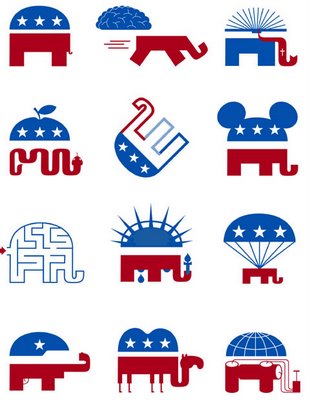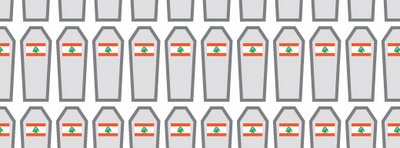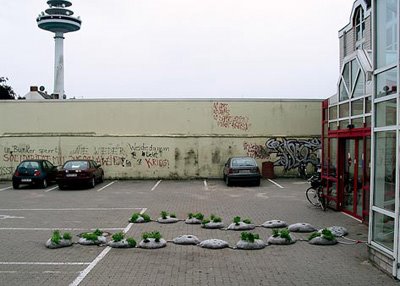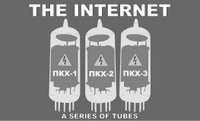Crudely constructed from such things as spoons, shoelaces and upholstery tacks, shivs lie somewhere between the graceful and the grotesque. They’re primitive, too — like outsider art, but produced deep on the inside... A shiv is all about masked utility: it’s an innocuous object with improbably toxic intent (whether used to attack others or to protect oneself...).
7.31.2006
Shiv.
Answer me this:
And I'm not just being a smartass: When Israel attacks a guerrilla group within the sovereign nation of Lebanon, isn't it a declaration of war against that country? Aren't there international laws about such things? Is Lebanon's army fighting against this incursion from the south? I mean, wouldn't Canada retaliate if the US started carpetbombing some militia group in tunnels beneath Winnipeg?
And don't forget the masterpieces.
 My, isn't this a cynical view of the art world. Birdgame Press' boardgame Art Shark! is described like this:
My, isn't this a cynical view of the art world. Birdgame Press' boardgame Art Shark! is described like this:Use your sneakiest tricks to make a fortune collecting art. Switch fakes with original art. Outbid other players at auction. And discover 64 masterpieces as you play.Via MAN.
64 art cards, 54 chance cards, 2 dice and lots of fun. Ages 7 to adult.
Rirkrit's "rak opera"
Rirkrit Tiravanija artistic directed a Thai rock opera based loosely on the Thai version of the Ramayana (Ramakien) at the Lincoln Center Festival. The New York Times review wasn't exactly glowing: "Grandly ambitious and inconclusive, overstuffed and sketchy... A concert tour might have been a better introduction to Thai rock..." Dubbed "a work in the international avant-spectacle mode," it featured three of Thailand's most popular bands, Sek Loso, the Photo Sticker Machine and Modern Dog, as well as an array of pop stars. While apparently not a rousing success, I blog it because I find Rirkrit's openness to new challenges and forms fascinating...
GOP links estate tax repeal to min. wage increase.
Republicans, those cagey compassionate conservatives, do a 180 and support an increase in the minimum wage, but with a catch: they're trying to roll the repeal of the estate tax into it. If that fails, they're also trying to link the estate tax to the renewal of other popular taxes that have recently expired, including research and development credit for businesses and deductions for college tuition.
Don't miss the excellent floor speech by Charlie Rangel on it: "If you care about poor folks--ACT LIKE IT. Give them a day by themselves. Don't mix their problems in with the richest of the rich in this country. Hypocrisy? I've now seen it all."
Don't miss the excellent floor speech by Charlie Rangel on it: "If you care about poor folks--ACT LIKE IT. Give them a day by themselves. Don't mix their problems in with the richest of the rich in this country. Hypocrisy? I've now seen it all."
Oil and the Embargo
Can oil do what nine presidents haven't--end the embargo on Cuba? The AP:
[R]ecent, sizable discoveries of it in the North Cuba Basin - deep-water fields that have already drawn the interest of companies from China, India, Norway, Spain, Canada, Venezuela and Brazil.Also: The Chicago Tribune on peak oil.
This, in turn, has reheated debate in the U.S. Congress and the Cuban-American community on an old question:
Has the time finally come to shelve the embargo - given America's need for more sources of crude at a time of rising gas prices, soaring global demand and the outbreak of war in the Middle East?
7.27.2006
Gusher: Oil profits soar a year after tax break
 Shell's profits jumped 36% in the last three months to $6.3 billion, ConocoPhillips' second quarter profits leapt 65% to $5.18 billion, and BP's take for the same period jumped to $7.3 billion in profits (that's 30% more than the same period a year ago), which means the company makes $55,000 each minute. As oil companies rake it in, despite $3+/gallon at the tank, let's remember that a year ago yesterday, the Bush administration passed the Energy Policy Act of 2005, "which lavished $14.5 billion in tax breaks on energy firms, nearly 60 percent of which went to 'oil, natural gas, coal, electric utilities and nuclear power.'"
Shell's profits jumped 36% in the last three months to $6.3 billion, ConocoPhillips' second quarter profits leapt 65% to $5.18 billion, and BP's take for the same period jumped to $7.3 billion in profits (that's 30% more than the same period a year ago), which means the company makes $55,000 each minute. As oil companies rake it in, despite $3+/gallon at the tank, let's remember that a year ago yesterday, the Bush administration passed the Energy Policy Act of 2005, "which lavished $14.5 billion in tax breaks on energy firms, nearly 60 percent of which went to 'oil, natural gas, coal, electric utilities and nuclear power.'"Update: Don't forget Chevron, whose 2Q profits hit an all-time high of $4.35 billion, and ExxonMobil made $10.4 billion over the same period--the equivalent to making $1318 each second.
And: Where will we live in 2025, when drinking water is scarce, sea levels are higher, and other effects of global warming cause mass migration? the Center for Climate Systems Research publishes an in-depth report that finds "the greatest increases in population density through 2025 are likely to occur in areas of developing countries that are already quite densely populated" and "the number of people living within 60 miles of a coastline is expected to increase by 35 percent over 1995 population levels, exposing 2.75 billion people worldwide to the effects of sea level rise and other coastal threats posed by global warming."
Earlier: America's worst greenwashers.
Image via Art not Oil.
7.26.2006
Radical cartography.
 After reading Marxist geographer Neil Smith's The New Urban Frontier (here's video of his talk at the Walker on globalization a few years ago), the title of the website Radical Cartography is enough to pique my interest, but this analysis of the "doughnut effect" of wealth distribution seals the deal. Plotting out wealth suggests that the concentric circles demographers speak of only appear in older cities; newer ones, like my own town of Minneapolis, have "wedges of wealth occupying a continuous pie-slice from the center to the periphery" and that poverty donuts almost universally have a five-mile radius, perhaps the distance the poor can travel without a car. (In these representations, pink is wealth, blue is poverty.) Above, New York City's wealth distribution.
After reading Marxist geographer Neil Smith's The New Urban Frontier (here's video of his talk at the Walker on globalization a few years ago), the title of the website Radical Cartography is enough to pique my interest, but this analysis of the "doughnut effect" of wealth distribution seals the deal. Plotting out wealth suggests that the concentric circles demographers speak of only appear in older cities; newer ones, like my own town of Minneapolis, have "wedges of wealth occupying a continuous pie-slice from the center to the periphery" and that poverty donuts almost universally have a five-mile radius, perhaps the distance the poor can travel without a car. (In these representations, pink is wealth, blue is poverty.) Above, New York City's wealth distribution.Also: When'd it get so expensive to be poor? Barbara Ehrenreich explores the costly side of poverty.
Via Gothamist.
"The killing of hostages."
Former National Security Advisor Zbigniew Brzezinksi:
I hate to say this but I will say it. I think what the Israelis are doing today for example in Lebanon is in effect, in effect -- maybe not in intent -- the killing of hostages. The killing of hostages.
Because when you kill 300 people, 400 people, who have nothing to do with the provocations Hezbollah staged, but you do it in effect deliberately by being indifferent to the scale of collateral damage, you're killing hostages in the hope of intimidating those that you want to intimidate. And more likely than not you will not intimidate them. You'll simply outrage them and make them into permanent enemies with the number of such enemies increasing.
WTF?
 After an "apparently deliberate" attack on UN peacekeeping forces by the IDF that killed four unarmed troops, after statistics were released indicating that 55% of casualties in Beirut are children under 15, and despite the fact that US fund recipient Israel is reportedly using white phosphorus weapons on civilians, the Bush administration refuses to call for a cease-fire on the Lebanese border. Isn't preventing the loss of another life more important than who's right or wrong?
After an "apparently deliberate" attack on UN peacekeeping forces by the IDF that killed four unarmed troops, after statistics were released indicating that 55% of casualties in Beirut are children under 15, and despite the fact that US fund recipient Israel is reportedly using white phosphorus weapons on civilians, the Bush administration refuses to call for a cease-fire on the Lebanese border. Isn't preventing the loss of another life more important than who's right or wrong?And then there's Iraq, where in the past two weeks "more Iraqi civilians have been killed than have died in Lebanon and Israel."
Image: George W. Bush WTF Candy, "Extra-Fancy candy for when life Extra-Sucks"
Rejiggering the GOP.

Illustrator Thomas Fuchs deconstructs the GOP logo in his sweet little series "Deconstructing Dumbo." Via reBlog.
7.24.2006
Self-serve comics.
 An indie (and much older) take on French publisher Maxi-Livres' book vending machines: Napa Books' comics dispenser. Seen at mbar in Helsinki, the 1940s-era retrofit sells cassettes, comics, and flipbooks.
An indie (and much older) take on French publisher Maxi-Livres' book vending machines: Napa Books' comics dispenser. Seen at mbar in Helsinki, the 1940s-era retrofit sells cassettes, comics, and flipbooks.
Disproportionate Force.
 The US is rushing "smart bombs" to Israel to help them fight a battle that Israel is already dominating. While Prime Minister Ehud Olmert claims that the Israeli Defense Force "is the most moral army in the world" and "does not and never has made a policy of targeting civilians," this graphic, based on death tolls reported by the BBC, uses flag-draped coffins to suggest otherwise. UN Human Rights Commissioner Louis Arbour says the destruction of Lebanon and the shelling of Israeli cities constitute "war crime(s)."
The US is rushing "smart bombs" to Israel to help them fight a battle that Israel is already dominating. While Prime Minister Ehud Olmert claims that the Israeli Defense Force "is the most moral army in the world" and "does not and never has made a policy of targeting civilians," this graphic, based on death tolls reported by the BBC, uses flag-draped coffins to suggest otherwise. UN Human Rights Commissioner Louis Arbour says the destruction of Lebanon and the shelling of Israeli cities constitute "war crime(s)."Via WMMNA.
7.23.2006
(Graphic) Design Like You Give a Damn
 Following up recent discussions about Cameron Sinclair's work with communities to build architecture that emerges from and embraces culture in Sri Lanka, Pakistan, and India, the story of graphic designer Wendy MacNaughton's work on a get-out-the-vote campaign for Rwanda's first democratic local elections in 2001 gets, well, a thumbs up. To promote voter turnout, MacNaughton had to "communicate equally to literate and non-literate voters, and be extremely sensitive to ethnicity and ethnic, political and economic division." The thumbs-up graphic, accompanied by the phrase "We vote," made sense to everyone since all legal documents in Rwanda are verified using a thumbprint. What's most interesting, though, is how MacNaughton had to adapt to regional differences.
Following up recent discussions about Cameron Sinclair's work with communities to build architecture that emerges from and embraces culture in Sri Lanka, Pakistan, and India, the story of graphic designer Wendy MacNaughton's work on a get-out-the-vote campaign for Rwanda's first democratic local elections in 2001 gets, well, a thumbs up. To promote voter turnout, MacNaughton had to "communicate equally to literate and non-literate voters, and be extremely sensitive to ethnicity and ethnic, political and economic division." The thumbs-up graphic, accompanied by the phrase "We vote," made sense to everyone since all legal documents in Rwanda are verified using a thumbprint. What's most interesting, though, is how MacNaughton had to adapt to regional differences.When she discovered her Mac was incompatible with the PCs ubiquitous in the country, and that photography couldn't be used since it wouldn't fit the vernacular style of the area and might underscore racial differences, she created hand-drawn images on scratch board as well as flyers and stencils. But what she knew of even these media required some creative adaptation:
There is no graffiti in Rwanda. In part, this is because there isn't any spray paint. In not considering this detail beforehand, I found myself with a stack of stencils, and no paint. A man I met at a car repair shop offered to “import” the spray paint from Congo. The paints came through without a problem and luckily USAID didn't ask too many questions.Read more at the Design Altruism Project. Via Speak Up.
Accustomed to buying spraymount at the corner store, I never considered how the posterswould hang on buildings and walls, let alone on trees and traditional huts. Tape and glue was scarce and too expensive to use. I shared my dilemma with a local shopkeeper from India. He suggested I make glue from a mixture of water and flour. Then I was told that sponges were too valuable to be used for gluing and that people would keep them for home use. I asked around and learned that hand brooms made of dried grass could also be used as a brush.
7.21.2006
Bush/Blair defy call for ceasefire
As the UK and US ignore the UN's call for a cease-fire in the nine-day Israel/Lebanon battle that amounts to the "collective punishment of the Lebanese people" (in Kofi Annan's words), The Independent runs an excellent graphic that says it all:
 Via Kottke.
Via Kottke.
 Via Kottke.
Via Kottke.
Open-Ended Utopia: The Art of Rirkrit Tiravanija
 Ever since Sir Thomas More coined the term utopia in the 16th century, visions of the perfect society have included matching jumpsuits, glass-domed biospheres, or remote islands where harmonic living is realized by placidly grinning beings. But as history has jumped the rails of that idyllic path, if it was ever on it in the first place, can we even imagine today what utopia might look like? Artist Rirkrit Tiravanija can, but he doesn’t create the kind of dreamy art you might expect. He transforms galleries into kitchens that serve up free pad Thai. He turns museums into low-power radio stations, a replica of his New York apartment, a functioning mechanic’s shop, and a studio where “street TV” is broadcast to the neighborhood. He builds chrome-plated kitchen consoles, theatrical stages out of plywood and 2x4s, and replica modernist homes from glass and steel, then invites people in to do... whatever: rehearse with their band, sleep, eat, listen to a DJ, debate topics of the day, read. And he plays informal host at an off-the-grid rice farm in Thailand that’s art only insofar as it fits his definition of the genre as “a space for possibilities.” This kind of art—in which the artist cedes creative control to the people who “complete” the work—looks suspiciously like chaos. And what’s utopian about that?
Ever since Sir Thomas More coined the term utopia in the 16th century, visions of the perfect society have included matching jumpsuits, glass-domed biospheres, or remote islands where harmonic living is realized by placidly grinning beings. But as history has jumped the rails of that idyllic path, if it was ever on it in the first place, can we even imagine today what utopia might look like? Artist Rirkrit Tiravanija can, but he doesn’t create the kind of dreamy art you might expect. He transforms galleries into kitchens that serve up free pad Thai. He turns museums into low-power radio stations, a replica of his New York apartment, a functioning mechanic’s shop, and a studio where “street TV” is broadcast to the neighborhood. He builds chrome-plated kitchen consoles, theatrical stages out of plywood and 2x4s, and replica modernist homes from glass and steel, then invites people in to do... whatever: rehearse with their band, sleep, eat, listen to a DJ, debate topics of the day, read. And he plays informal host at an off-the-grid rice farm in Thailand that’s art only insofar as it fits his definition of the genre as “a space for possibilities.” This kind of art—in which the artist cedes creative control to the people who “complete” the work—looks suspiciously like chaos. And what’s utopian about that?Everything, says Tiravanija. “I think these previously modeled utopian conditions have always been in a kind of conformity of ideas, which is to say that somehow everyone should become one cohesive structure, one cohesive consciousness, and that would bring with it a sense of freedom,” he explains. Instead, he sees utopia as “understanding difference” and “being able to exist in chaos. To live within a chaotic structure.” He adds, “Chaos for me is life, is change, is moving, we are always living within it.” This sensibility comes as much from his family history— he’s Thai and was raised Buddhist—as from his geography: a diplomat’s son, he was born in Buenos Aires and has lived a nomadic life, making his home in Ethiopia, Canada, the US, Germany, and Thailand.
You could say his art is all about building “chaotic structures.” Then again, it’s about lots of things; his work is so open-ended and departs so radically from the art market’s orientation toward precious objects, that it’s earned many labels, many—like utopian or chaotic—that only tell part of the story. But one that’s stuck, for better or worse, is French theorist-critic Nicholas Bourriaud’s “relational aesthetics,” the idea of judging the social relationships sparked by an artwork instead of merely considering the object. A 1992 exhibition, one that first earned him international attention, exemplified this notion. It was a deceptively simple gesture: after moving the contents of the storeroom at a New York commercial gallery into the main exhibition hall, he turned the room into a social space where he cooked two pots of curry—white and red—for whomever showed up to eat. Echoing Marcel Duchamp’s sentiment that “It’s not what you see that is art; art is the gap,” the only objects left to document the performance were plates dotted with remnant rice, leftover ingredients, a used cook stove, and dirty utensils. The gap between objects, where arguments ensued and bellies were filled, jokes were made and curry spilled, remains mysterious and un-ownable.
 Such ethereal art can be understood through the lenses of Thai culture (where familial bonds are reinforced at mealtime) or Tiravanija’s memories (his grandmother had a cooking show on Thai TV), but it’s also informed by his study of Western avant-garde practices and its rich history of institutional critique by Dadaist trickster Duchamp, “social sculptor” Joseph Beuys, and others. By preparing food in a gallery, he inverts some of art’s revered standards. He converts an environment of white walls and whispers into a realm of scent, steam, and sometimes raucous dialogue.
Such ethereal art can be understood through the lenses of Thai culture (where familial bonds are reinforced at mealtime) or Tiravanija’s memories (his grandmother had a cooking show on Thai TV), but it’s also informed by his study of Western avant-garde practices and its rich history of institutional critique by Dadaist trickster Duchamp, “social sculptor” Joseph Beuys, and others. By preparing food in a gallery, he inverts some of art’s revered standards. He converts an environment of white walls and whispers into a realm of scent, steam, and sometimes raucous dialogue.He turns the venerated artist, a high priest of culture, into a humble, apron-wearing servant. And most remarkably, he creates art that, for the most part, can’t be bought or sold, punning with the very idea of the “art consumer.” (Even with these critiques, he remains an art-world favorite: his numerous accolades include the 2004 Hugo Boss Prize, a prestigious honor that comes with a $50,000 check and a solo show at the Guggenheim). As a result, his art is always alive and – because he’s not really controlling its outcomes—unpredictable. “I often work against ways of being museologized,” he says, “of becoming dead in a sense.”
Tiravanija’s most ambitious project is just such a living endeavor. In 1998, he and artist Kamin Lertchaiprasert purchased a rice farm in Sanpatong, a village 20 minutes outside Chiang Mai, Thailand. With no electricity or running water, it’s a clean slate on which to create a dynamic community for an ever-changing cast of farmers, local students, and international artists. It was founded “with anonymity and without the concept of ownership ... to be cultivated as an open space, though with certain intentions towards community, towards discussions and towards experimentation in other fields of thought.”
The pair never intended "the land" as art, but given the vague nature of what it is—an open framework in which things can happen – and the involvement of well-known artists like Tiravanija, Tobias Rehberger, Peter Fischli and David Weiss, Philippe Parreno and others, how could it not be viewed as such? Still, Tiravanija likens the land to something else, “an empty table top that people bring different projects to. They can bring [something] to it, use the top, leave things there or take them away, but it’s basically an empty table.”
 Like Tiravanija’s work elsewhere, nearly all the projects to come off this table are functional. Several 2x4-meter stilt houses have been built, including one for Tiravanija that has levels dedicated to each of the “three spheres of human need”: community and sustenance, reading and meditation, and rest. The Danish art group Superflex has installed a system for collecting biogas for cooking fuel from the manure left by the land’s roving water buffalo. Artist Prachya Phintong has designed a fish farm to utilize the water sur- rounding two rice fields maintained by a farmer known as Professor Wei and area art students (rice not used by the community can’t be sold for profit, Lertchaiprasert insists, and is donated to village families living with AIDS). The Netherlands’ Atelier van Lieshout developed a composting toilet system, and artists Philippe Parreno and Francois Roche built a “battery house” called Hybrid Muscle. A futuristic hall for hosting community events, its exterior is covered with plastic “leaves” that hold 20-ton concrete blocks; as buffalo harnessed to a pulley system and a dynamo lift the counterweights, their muscle energy is converted into electrical power.
Like Tiravanija’s work elsewhere, nearly all the projects to come off this table are functional. Several 2x4-meter stilt houses have been built, including one for Tiravanija that has levels dedicated to each of the “three spheres of human need”: community and sustenance, reading and meditation, and rest. The Danish art group Superflex has installed a system for collecting biogas for cooking fuel from the manure left by the land’s roving water buffalo. Artist Prachya Phintong has designed a fish farm to utilize the water sur- rounding two rice fields maintained by a farmer known as Professor Wei and area art students (rice not used by the community can’t be sold for profit, Lertchaiprasert insists, and is donated to village families living with AIDS). The Netherlands’ Atelier van Lieshout developed a composting toilet system, and artists Philippe Parreno and Francois Roche built a “battery house” called Hybrid Muscle. A futuristic hall for hosting community events, its exterior is covered with plastic “leaves” that hold 20-ton concrete blocks; as buffalo harnessed to a pulley system and a dynamo lift the counterweights, their muscle energy is converted into electrical power.Vision and whimsy abound at the land—Rehberger’s house was inspired by his favorite German dish, lentil, noodles and broccoli, and Superflex’s biogas system stores fuel in eye-popping orange balloons—but they’re always intercut with both ethereal spirituality and pragmatic reality. As curator Karen Demavivas writes, it is an “ephemeral utopia of cracks, leaks, buffalo waste, termites, big red ants, rainy seasons and mold, a whirl of decay and renewal ... Injected with a Buddhist sensibility, it strives to be a micro-utopia of conscious, daily acts that propagate an equanimous life in the present for the betterment of a community and, more broadly, society.”
While Tiravanija shies away from that last part—the saving the world bit—he reiterates that the land, like all his work, is ultimately social: “We’re not interested in making a sculpture park. We’re much more interested in conditions of living.”
Originally published in the Canadian magazine Geez, Issue 3, Summer 2006.
7.19.2006
That Guy.
Mark Morford writes that Bush thinks he's That Guy, the "one everybody just loves to have around, the one who sincerely thinks his goofy charm is so appealing and so innocuous and so licky-puppy friendly that he can get away with all sorts of casual infractions and weird gestures that no one else would care to attempt lest they appear, you know, dorky as a knob." In fact, as his bumble-laden appearances at the G8 Summit suggest, he's That Guy, "the best man at the wedding party who is standing in the center of the room, casually and cluelessly telling off-color or racist jokes that offend everyone but that he thinks are hilarious":
Bushit: Bush's slip of the S-bomb at the G8 puts network TV producers in a quandary: if they air the president's utterance as news they face a $325,000 fine, unlike their cable counterparts, thanks to a post-"wardrobe malfunction" broadcast indecency law the president signed last year.
Israel and Lebanon are burning. Iraq is in tatters. North Korea is spitting on the world. Global leaders are gathered to discuss the most pressing and violent issues on the planet, many of which Bush had a clammy hand in exacerbating. Might not be the best time
for the leader of the free world to give a cheesy frat-guy neck rub to his German gal-pal in front of the world media. You think?
Bushit: Bush's slip of the S-bomb at the G8 puts network TV producers in a quandary: if they air the president's utterance as news they face a $325,000 fine, unlike their cable counterparts, thanks to a post-"wardrobe malfunction" broadcast indecency law the president signed last year.
7.18.2006
7.17.2006
Apocalypse... now?
 While the Rapture Index hasn't made much of an uptick yet--it's at 157, nowhere near the all-time high of 182 on September 24, 2001--talk of the Second Coming of the Lord is back in vogue with Armageddon-fixated Christian weirdos who see the new chaos in the Middle East as promising. But it's not the book of revelations that gets these folks excited; it's Zechariah 14: “For I [Jesus Christ] will gather all nations against Jerusalem to battle; and the city shall be taken, and the houses rifled, and the women ravished; and half of the city shall go forth into captivity, and the residue of the people shall not be cut off from the city.”
While the Rapture Index hasn't made much of an uptick yet--it's at 157, nowhere near the all-time high of 182 on September 24, 2001--talk of the Second Coming of the Lord is back in vogue with Armageddon-fixated Christian weirdos who see the new chaos in the Middle East as promising. But it's not the book of revelations that gets these folks excited; it's Zechariah 14: “For I [Jesus Christ] will gather all nations against Jerusalem to battle; and the city shall be taken, and the houses rifled, and the women ravished; and half of the city shall go forth into captivity, and the residue of the people shall not be cut off from the city.”"You need to watch Jerusalem as never before," said this fella back in March. "We are going to see half of that city fall very soon. It could happen this year—2006!
Even Newt Gingrich is getting apocalyptic: he calls the battle in Israel and Lebanon World War III and urges Bush to do the same. He says the president should get the US involved with "a militancy that says 'We're not going to lose a city'." But Gingrich, who has his own presidential ambitions, is more likely worried about the End Times for the GOP's two-house rule in the upcoming elections. Admitting such fears and their political implications, he says, "The minute you use the language [World War III, the message becomes] 'OK, if we're in the third world war, which side do you think should win?'"
Visit Beliefnet for less kooky Christiaqn coverage of the conflict.
[image]
Bush uncensored...
Bush, unaware he was miked at the G8, told Tony Blair, "What they need to do it to get Syria to get Hezbollah to stop doing this shit."
The price of being despised.
 At least $2.9 million dollars: that's how much the US taxpayers are forking over for George W. Bush's security detail as he attends the G8 summit in St. Petersberg. "Detail" may be a misnomer as it suggests something small and precise: in fact, Bush's unprecedented security pricetag included two 747 jets, three dozen armored vehicles (including 20 that were flown in by the US government), three helicopters, and more than 100 secret service agents.
At least $2.9 million dollars: that's how much the US taxpayers are forking over for George W. Bush's security detail as he attends the G8 summit in St. Petersberg. "Detail" may be a misnomer as it suggests something small and precise: in fact, Bush's unprecedented security pricetag included two 747 jets, three dozen armored vehicles (including 20 that were flown in by the US government), three helicopters, and more than 100 secret service agents.Should taxpayers have to foot the bill for the president's safety? Absolutely. But shouldn't our troops--some who still have no body armor--have some protection in an actual war zone?
Speaking of body armor, why can't Rep. Gene Taylor, D-Miss., get a straight answer from the Pentagon on why government payouts to an official for Point Blank Body Armor, contracted to outfit US troops, reportedly increased from $500,000 in 2001 to $70 million in 2004?
[image: babies don't like him either.]
Portable park.
 Fear they're paving over paradise? Halifax architecture student David Gallaugher created this grass-lined wheel to "simulate an eternal lawn environment and to draw attention to what he considers a North American obsession with manicured lawns." [via]
Fear they're paving over paradise? Halifax architecture student David Gallaugher created this grass-lined wheel to "simulate an eternal lawn environment and to draw attention to what he considers a North American obsession with manicured lawns." [via]And in comments, Duich McKay points out that Glasgow's John Gilbert Architects created its own temporary park in a parking space, in homage to Rebar's park(ing) and in honor of 2006 Architecture Week.
7.13.2006
Transcending incompetence, reframing Bush
 It's soooo easy to see George W. Bush as this Nation cover did--as a doddering doofus who's blundering his way towards hell in handbasket (with America in said basket). But not so fast. To assume that Bush's failures--Katrina, Iraq War intelligence, through-the-roof budget deficits, to name just a few--are the result of stupidity misses a key point, as George Lakoff, Sam Ferguson, and Marc Ettlinger point out: these disasters "are the natural, even inevitable result of his conservative governing philosophy."
It's soooo easy to see George W. Bush as this Nation cover did--as a doddering doofus who's blundering his way towards hell in handbasket (with America in said basket). But not so fast. To assume that Bush's failures--Katrina, Iraq War intelligence, through-the-roof budget deficits, to name just a few--are the result of stupidity misses a key point, as George Lakoff, Sam Ferguson, and Marc Ettlinger point out: these disasters "are the natural, even inevitable result of his conservative governing philosophy." This frame places the blame for many of America's problems today firmly where it belongs, with a conservative governing philosophy that believes "government’s positive role in people’s lives outside of the military and police should be minimized; the President is the moral authority; and free markets are enough to foster freedom and opportunity." While Bush is the figurehead of this philosophy, you can bet conservatism's adherents will be running to replace him in 2008.
In fact, as Lakoff et al contend, the failures progressives point out might actually be viewed as successes by "starve the beast" conservatives:
One of the goals of Conservatives is to keep people from relying on the federal government. Under Bush, FEMA was reorganized to no longer be a first responder in major natural disasters, but to provide support for local agencies. This led to the disastrous response to Hurricane Katrina. Now citizens, as well as local and state governments, have become distrustful of the federal government’s capacity to help ordinary citizens. Though Bush’s popularity may have suffered, enhancing the perception of federal government as inept turned out to be a conservative victory.Our days with George W. Bush are numbered, but as Jeb Bush, Bill Frist, and a gaggle of like-minded conservatives seek annointing as his successor, progressives need to clearly name--and take an accurate and mind-bogglingly large metric--of the enemy.
Conservatives also strive to get rid of protective agencies and social programs. The deficit Bush created through irresponsible tax cuts and a costly war in Iraq will require drastic budget cuts to remedy. Those cuts, conservatives know, won’t come from military spending, particularly when they raise the constant specter of war. Instead, the cuts will be from what Conservatives have begun to call “non-military, discretionary spending;” that is, the programs that contribute to the common good like the FDA, EPA, FCC, FEMA, OSHA and the NLRB. Yet another success for the conservative agenda.
Both Iraq and Katrina have enriched the coffers of the conservative corporate elite, thus further advancing the conservative agenda. Halliburton, Lockhead Martin and US oil companies have enjoyed huge profit margins in the last six years. Taking Iraq’s oil production off-line in the face of rising international demand meant prices would rise, making the oil inventories of Exxon and other firms that much more valuable, leading to record profits. The destruction wrought by Katrina and Iraq meant billions in reconstruction contracts. The war in Iraq (and the war in Afghanistan) meant billions in military equipment contracts. Was there any doubt where those contracts would go? Chalk up another success for Bush’s conservative agenda.
Bush also used Katrina as an opportunity to suspend the environmental and labor protection laws that Conservatives despise so much. In the wake of Katrina, environmental standards for oil refineries were temporarily suspended to increase production. Labor laws are being thwarted to drive down the cost of reconstruction efforts. So, amidst these “disasters,” Conservatives win again.
Where most Americans see failure in Iraq – George Miller recently called Iraq a “blunder of historic proportions” – conservative militarists are seeing many successes. Conservatives stress the importance of our military — our national pride and worth is expressed through its power and influence. Permanent bases are being constructed as planned in Iraq, and America has shown the rest of the world that we can and will preemptively strike with little provocation. They succeeded in a mobilization of our military forces based on ideological pretenses to impact foreign policy. The war has struck fear in other nations with a hostile show of American power. The conservatives have succeeded in strengthening what they perceive to be the locus of the national interest — military power.
(Thanks, Leif.)
7.12.2006
Phenomenology and the little brown dress
 "I am making one small, personal attempt to confront consumerism by refusing to change my dress for 365 days." So began the year-long performance work LittleBrownDress by Seattle choreographer Alex Martin. For a full year, which just ended July 7, she wore a hand-made (open-source) brown dress of her own design. Yes, she washed it, patched it, replaced a few buttons. Yes, she took it off to sleep at night. But for the full year, chronicled at her blog, she wore the simple outfit--as art and as protest against fashion conformity, sweatshop labor, and commodity culture in general. As she journaled her day-by-day experiences, the project gained international audiences, from interviews in Canada and Australia and a nice writeup in the Seattle Times, to countless reader comments and a Today show appearance.
"I am making one small, personal attempt to confront consumerism by refusing to change my dress for 365 days." So began the year-long performance work LittleBrownDress by Seattle choreographer Alex Martin. For a full year, which just ended July 7, she wore a hand-made (open-source) brown dress of her own design. Yes, she washed it, patched it, replaced a few buttons. Yes, she took it off to sleep at night. But for the full year, chronicled at her blog, she wore the simple outfit--as art and as protest against fashion conformity, sweatshop labor, and commodity culture in general. As she journaled her day-by-day experiences, the project gained international audiences, from interviews in Canada and Australia and a nice writeup in the Seattle Times, to countless reader comments and a Today show appearance. But after the final performance, an Undressing Party, someone swiped the dress off the stage. And, like the famed Traveling Gnome Prank, the thief is emailing Martin pictures of the dress' whereabouts:
On Saturday night they emailed me photos of the dress sinking into a body of water (which I think is Lake Washington) . . . and on Sunday night (just a few hours ago) they sent a photo of the dress at a Goodwill donation station.What's next for Martin? Intrigued by her experiment in living in an "intentional wardrobe," she's planning a year wearing "only things I have made myself head to toe (including shoes, bag, jewelry, underwear, socks, you name it)."
Now, I was sort of excited about the dress having a final resting place in our local waterways (it's all biodegradable, after all, and I imagined it enjoying a peaceful, slow decomposition amongst the tangy pollution and lusty migrating Coho.
Then I had a brief fantasy that the dress would begin sending missives from exotic locales, in the manner of the 'Amelie' garden gnome. But that would have taken quite a bit of commitment on the part of the hacker, and I'd have been surprised and impressed.
So, it appears that the dress is now in the hands of our mega-thrift powerhouse, Seattle Goodwill. Now, I've worked for Seattle Goodwill before, and I just don't think the brown dress will make the cut on the production floor. That sucker is really worn out. I'm debating whether to make a call to my friends Alice and Betsy just so they know what they might have their hands on . . . otherwise I'm pretty sure the dress will be baled for scrap, and who knows where it will end up!
[via]
7.11.2006
Bush Family Top 5
The projected budget deficit for 2006 will be the fourth largest in American history. While he inherited a $284 billion surplus when he took office, George W. Bush's only competition for the five worst deficits in history is his dad:
1. 2004 (George W. Bush) $413 billion
2. 2003 (George W. Bush) $378 billion
3. 2005 (George W. Bush) $318 billion
4. 2006 (George W. Bush) $296 billion (projected)
5. 1992 (George H. W. Bush) $290 billion
1. 2004 (George W. Bush) $413 billion
2. 2003 (George W. Bush) $378 billion
3. 2005 (George W. Bush) $318 billion
4. 2006 (George W. Bush) $296 billion (projected)
5. 1992 (George H. W. Bush) $290 billion
Fat facts.
 Obesity is ballooning in America, according to a new 20-year report by the Centers for Disease Control, with 6 out of 10 adults having a body mass index of 30 or more (the technical definition of obesity) and nearly 1 in 5 children being overweight or obese. Watch this remarkable flash animation to see how we've been putting on the pounds, then check out statistics for your state. Here in Minnesota, less than 10 percent of the population was obese in 1985, but twenty years later the percentage has risen to between 20 and 24% of the population.
Obesity is ballooning in America, according to a new 20-year report by the Centers for Disease Control, with 6 out of 10 adults having a body mass index of 30 or more (the technical definition of obesity) and nearly 1 in 5 children being overweight or obese. Watch this remarkable flash animation to see how we've been putting on the pounds, then check out statistics for your state. Here in Minnesota, less than 10 percent of the population was obese in 1985, but twenty years later the percentage has risen to between 20 and 24% of the population.
Steam-Powered Internet Machine
 Ted Stevens, meet Jeremy Deller. The Turner Prize-winning British artist has a wonderfully impractical new piece called the Steam-Powered Internet Machine. While there's no tubes, it does feature a Mac laptop run by a Nemo-esque steam contraption. Deller, who created the piece with longtime collaborator Alan Kane, wanted to connect the steam age and the digital age--which are "not so far apart"--while also "inverting economics" by creating a wildly uneconomical power source for a portable computer. (British readers can see the piece in action this weekend.)
Ted Stevens, meet Jeremy Deller. The Turner Prize-winning British artist has a wonderfully impractical new piece called the Steam-Powered Internet Machine. While there's no tubes, it does feature a Mac laptop run by a Nemo-esque steam contraption. Deller, who created the piece with longtime collaborator Alan Kane, wanted to connect the steam age and the digital age--which are "not so far apart"--while also "inverting economics" by creating a wildly uneconomical power source for a portable computer. (British readers can see the piece in action this weekend.)Deller's previous work includes his Turner-winning 2004 piece The History of the World 1997–2004; a re-enactment of a famous British miners' strike, The Battle of Orgreave; and his co-curation of Folk Archive.
7.07.2006
Bugs in the travel plans...
 If the record-smashing price of crude oil--$75.78/gallon--doesn't affect tonight's drive to visit family in Wisconsin, then maybe this will: a hatch of mayflies along the Wisconsin border was so huge it showed up on the National Weather Service's radar!
If the record-smashing price of crude oil--$75.78/gallon--doesn't affect tonight's drive to visit family in Wisconsin, then maybe this will: a hatch of mayflies along the Wisconsin border was so huge it showed up on the National Weather Service's radar! [via]
7.05.2006
Unenlightened Liberty.
Honky if you love PlayStation!
Ken Lay Dead
A massive coronary prevented the Enron chief from having to live out his last days in prison.
Urban tube-garden.
 These soil loaves by Danish collective n55 allow for urban row gardening of all kinds. Dirt and compost are encased in a tube of semi-permeable plastic and a hose from a downspout can keep your impromptu plantings going all season long.
These soil loaves by Danish collective n55 allow for urban row gardening of all kinds. Dirt and compost are encased in a tube of semi-permeable plastic and a hose from a downspout can keep your impromptu plantings going all season long. 
7.04.2006
Transcend the allegiance to flags...
Howard Zinn:
On this July 4, we would do well to renounce nationalism and all its symbols: its flags, its pledges of allegiance, its anthems, its insistence in song that God must single out America to be blessed.Read it all.
Is not nationalism -- that devotion to a flag, an anthem, a boundary so fierce it engenders mass murder -- one of the great evils of our time, along with racism, along with religious hatred?
Negative Space design

Conan O'Brien on the logo for NASA's new shuttle mission, STS-121 Discovery, set to launch this afternoon:
"This is the most confusing logo... It looks like the Space Shuttle is having sex with a helicopter during the birth of Jesus."
Occupied by war.
 We're not in a war, we're in an occupation, says George Lakoff. He proposes an alternative to the War Frame the Republicans use to justify prolonged action in Iraq (i.e. only cowards "cut and run"). The Occupation Frame goes like this:
We're not in a war, we're in an occupation, says George Lakoff. He proposes an alternative to the War Frame the Republicans use to justify prolonged action in Iraq (i.e. only cowards "cut and run"). The Occupation Frame goes like this:Our troops were trained to fight a war, not to occupy a country where they don't know the language and culture; where they lack enough troops, where they face an anti-occupation insurgency by the Iraqis themselves; where most of the population wants them out; where they are being shot at and killed by the very Iraqis they are training; and where the U.S. has given up on reconstruction and can't do much positive good there.And: as the count of American dead in Iraq inches closer to the number killed in the 9/11 attacks--one of the many reasons the Bush administration has used to justify the war--it's worth asking: how's the hunt for Osama bin Laden going? Late last year, the CIA closed the special unit that'd been hunting the 9/11 mastermind for a decade.
The Occupation Frame fits a politically inconvenient truth. Most people don’t want to think of our army as an occupation force, but it is. An occupying army can’t win anything. The occupation only helps Al Qaeda, which Iraqis don’t want in their country since Al Qaeda attracts foreigners who have been killing Iraqis.
Image: Vietnam protest poster, circa 1971
Power bouquet
 "Energy production turns 'heroic'" with these wind turbines reimagined by Dutch designers. "100 MW mountains, a cooperation between One Architecture, Ton Matton and NL architect, suggested that grouping up to 10 turbines into a kind of flower bouquet would add a nice touch to the landscape."
"Energy production turns 'heroic'" with these wind turbines reimagined by Dutch designers. "100 MW mountains, a cooperation between One Architecture, Ton Matton and NL architect, suggested that grouping up to 10 turbines into a kind of flower bouquet would add a nice touch to the landscape." [via]
[via]
Ted Stevens, Technologist
 According to Republican Sen. Ted Stevens, who voted against basic net neutrality provisions last week, the entire internet was sent by his staff through a series of tubes. How marvelous!
According to Republican Sen. Ted Stevens, who voted against basic net neutrality provisions last week, the entire internet was sent by his staff through a series of tubes. How marvelous!I just the other day got, an internet was sent by my staff at 10 o'clock in the morning on Friday and I just got it yesterday. Why?Stevens' retarded view of technology has already spawned a t-shirt.
Because it got tangled up with all these things going on the internet commercially...
The regulatory approach is wrong. Your approach is regulatory in the sense that it says "No one can charge anyone for massively invading this world of the internet". No, I'm not finished. I want people to understand my position, I'm not going to take a lot of time. [?]
They want to deliver vast amounts of information over the internet. And again, the internet is not something you just dump something on. It's not a truck.
It's a series of tubes.
And if you don't understand those tubes can be filled and if they are filled, when you put your message in, it gets in line and its going to be delayed by anyone that puts into that tube enormous amounts of material, enormous amounts of material.
7.03.2006
The Long Emergency
Superior Broadcast Network just posted a stream of James Howard Kunstler's keynote at the energy fair last weekend, plus some photos, a short radio broadcast, and other odds and ends. Check it out.
Subscribe to:
Comments (Atom)






